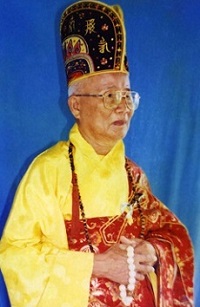PARIS, 9 May 2016 (VCHR) – From the Thanh Minh Zen Monastery in Saigon (Ho Chi Minh City), the Patriarch of the Unified Buddhist Church of Vietnam Thích Quang Độ has sent a letter to US President Barack Obama urging him to press Vietnam’s leaders on human rights when he visits the Communist state later this month. The US President will make his first trip to Vietnam when he comes to the region to attend the G-7 Summit in Japan on 26-27 May.
Thích Quảng Độ, 87, prominent dissident and 2016 Nobel Peace prize nominee, sent the letter through clandestine channels to the UBCV’s International Spokesman and VCHR President Vo Van Ai, who forwarded it to the White House. The leader of the independent, non-recognised UBCV has been held under de facto house arrest since 2003 without any justification or charge. His communications and visits are monitored and he is subjected to continuous Police surveillance. Although he is allowed to receive certain diplomatic visits, Buddhists and other visitors are frequently harassed and threatened. Police say they must not visit Thích Quảng Độ because he is a “criminal”. The UBCV leader has spent three decades in detention (internal exile, prison and house arrest) for his outspoken criticism of government abuses of religious freedom and human rights.
In the letter, Thích Quảng Độ said the Vietnamese people looked forward to the US President’s visit. For himself, he had a “debt of gratitude” to pay to the US, because he was released from prison thanks to an appeal by former US Secretary of State Madeleine Albright who visited Vietnam in 1998. However, he wrote, “I am not writing to ask you to win my freedom. More important, I sincerely urge you to use your trip to speak out for the thousands of Vietnamese, young and old, men and women, farmers and workers, academics, journalists, bloggers and followers of all religious denominations who are suffering imprisonment, house arrest, assaults and harassments because of their engagement for religious freedom, democracy and the respect of human rights”.
Commending Vietnam’s economic opening, he nevertheless regretted that “the government has made no attempt to open the political system, nor establish the institutions necessary to safeguard its citizens’ rights. Forty-one years after the end of the Vietnam War, we still have no free press, no democratic opposition parties and no independent civil society”.
Vietnam’s young generation look to social networks and the Internet to communicate and learn new ideas, he said, yet “this thirst for connectivity has led many into prison, condemned under archaic laws couched in Cold War rhetoric such as “abusing democratic freedoms to threaten the interests of the state”. Economic globalization without political rights in Vietnam had seriously impacted workers, who “endure sweatshop conditions and inadequate pay, yet have no free trade unions to voice their grievances and defend their rights”.
“As your visit approaches”, Thích Quảng Độ told President Obama, “human rights abuses are escalating in Vietnam. Promises of reform at the Communist Party’s XII Congress in January have not been upheld, and a hard-line leadership has now taken the helm. The former Minister of Public Security is now the President, and the climate of repression is palpable”. Political trials in March 2016 alone had resulted in prison sentences of a total of 22 years for seven human rights activists, and the National Assembly had adopted extensive new legislation to further restrict human rights.
“Vietnamese people welcome the strengthened relationship between the United States and Vietnam, and we believe it will help put our government on the path to reform”, he said. But at the same time, Vietnamese were convinced that this relationship was only sustainable if it was grounded on the mutual respect of democratic freedoms and human rights.
The UBCV Patriarch emphasized the crucial importance of the right to freedom of religion or belief – “the mother of all human rights” – and highlighted the role of Buddhism in the process of democratization in Vietnam: “Vietnam is home to a wide diversity of religions, but it is in majority a Buddhist country. Over the past 2,000 years, Lord Buddha’s teachings of tolerance and compassion have shaped the culture and identity of the Vietnamese people, and inspired them with a spirit of liberty, social justice and independence that characterises them today. It is precisely this culture of freedom and independence that the Vietnamese government is determined to stifle and suppress”.
In conclusion, Thích Quảng Độ urged President Obama “to stand by us, and speak out for human rights in your visit to Vietnam. By so doing, you will make this a truly historic occasion, one we will remember as a turning point in the movement for freedom and democracy in Vietnam”.





1 Comment
A Di Đà Phật.
Kính mong PTTPGQT vui lòng dịch lại tiếng Việt bản văn của đức Tăng thống thượng QUẢNG hạ ĐỘ gởi Tổng thống OBAMA.
Đa số Phật tử Việt Nam muốn đọc bản văn trên bằng tiếng Việt. Chân thành xin cảm ơn trước PTTPGQT.